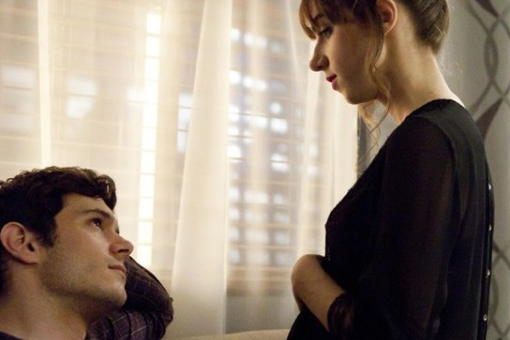Sign up for the
TSL Newsletter
and get $50 off Final Draft 12
By Meredith Alloway · March 18, 2013

Some things are better left in the past. Or at least that’s how the saying goes. But for the leading man in Neil LaBute’s Some Girls, he’s in to digging up his dirt. Adam Brody plays Man, yes the character is nameless (cheeky), and he’s embarked on a mission to re-connect with his exes. Engaged to be married, he hopes that he can “clear the air” before moving forward with the vow. What is he really doing? Who knows? And that’s the puzzle that propels us into LaBute’s latest on screen adaptation. Sometimes good, juicy, unpredictable dialogue and a slew of twisted characters is all we really need to stay on our toes.
Brody, seemingly miscast in the beginning, proves deliciously slippery as our main subject. His puppy eyes and genuine demur make his romantic endeavors that much more maddening. We first meet Sam (Jennifer Morrison). They go way back, we’re talking prom-drama-way-back. Unaware yet of Man’s intentions, we wonder why he’s called her in the first place. An awkward first few moments in his hotel room unwind into surprising confessions.
The scene serves as our opening action, which in most films is crowded with montages and quipped visual exposition. LaBute stays true to his stage play roots and allows this lone scene to tell all. It’s very clear that Man’s mission to reconcile is unclear. Once you give in to this theatrical rhythm and one-setting, dialogue-heavy form, the story takes off. It just means, dare I say it, the film requires you to listen.
Ex number two is the sultry Tyler (Mia Maestro). She’s nothing like Sam, and we already begin to wonder about Man’s track record. He and Tyler’s relationship is overtly sexual and in turn, obviously, he’s tempted. His “I still want you” admission doesn’t help either. Master of mixed messages (coining that), he then reveals what actually ended their affair. Trapping her in the sad frivolity of what they once had, his disposition grows increasingly parasitic. But so much so that LaBute allows us to laugh. After all, men deserve a good scoff. Did I say men? I meant Man.
Lindsey, Reggie and Bobbi round out a vast palette of his past. His tastes are truly expansive. Emily Watson channels Mrs. Robinson as Lindsey, but less broken and with more bravado. She and Man had an affair while teaching at the same university, all behind her husband’s back. Although she reveals she loved hearing his whispers of “their future,” she has her own motives behind their present meeting. Maybe it takes an older woman to, well, strip our main man of his powers…
Zoe Kazan is bubbly and ruby-lipped as Reggie. She’s much younger than the other women and it turns out her feelings for Man stem from way back. After all, a first kiss changes everything. Then there’s the one that got away: Bobbi. Kristen Bell, I can’t put a finger on her, but no matter what role she’s in, she’s always likeable. We’re on her side from the beginning, like we are with the other women. But perhaps with her blonde locks, she’s the Rapunzel he’s been searching for.
Ha! If only! LaBute’s no fairy tale. He doesn’t dish out happy endings easily. And that’s exactly what keeps Some Girls from drifting into the abyss of play-to-film flop. The characters’ complexities truly drive the plot. Human desire is infinite. So is a person’s capacity to fulfill selfish ambition. After all, each woman does agree to meet Man in a hotel room. They have to want something too, right?
Yes, the film lulls a little in the middle. The momentum excels within each scene, but sometimes the film as a whole suffers. Keeping our eye entertained in a single hotel room setting makes director Daisy von Scherler Mayer’s blocking obvious at times. There are a lot of crosses that seem thirsty for motivation and purely in the script to freshen up the space. But then again, that’s exactly what the people trapped in it are trying to do. Let’s just say the “cross to get water” cross was used frequently and Fiji was a major sponsor.
In the end, we must rejoice because the art of the wordsmith is not lost! LaBute assures us good writing can drive a film. Who knew?